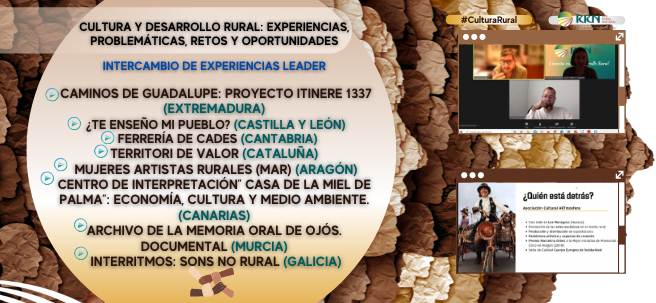
01 de July de 2022
The RRN has organized the LEADER experience exchange program "Culture and Rural Development: Experiences, Problems, Challenges, and Opportunities," which aims to reflect on how to make culture a driving force for development in the region and a tool for improving the quality of life of its inhabitants.
- The National Rural Network (RRN) has organized the "Culture and Rural Development" conference, an exchange of LEADER experiences in which rural stakeholders have presented experiences, problems, challenges and opportunities to combine cultural and rural development.
- The event brought together 110 attendees and included the participation of Local Action Groups (LAG), LEADER grant recipients, public administrations, and social and cultural action entities.
"Tourism doesn't create community, but culture does." This is the statement made by Benito Burgos, coordinator of the "Culture and Ruralities" program. of the Ministry of Culture and Sport at the LEADER experience exchange organized by the National Research Council (RRN) on "Culture and Rural Development: Experiences, Problems, Challenges, and Opportunities ." Thus, Benito confirmed that, from the perspective of public administration, "culture appears as one of the ten key elements of the demographic challenge ."
Hence the objective of this RRN conference, which aims to reflect on how to make culture a driving force for regional development and a tool for improving the quality of life of its inhabitants. To this end, Local Action Groups (LAGs), LEADER grant recipients, public administrations, and social and cultural action entities participated, presenting projects developed in their respective areas that have served to create new employment opportunities and new cooperation networks within their localities.
Participants
In this implementation of culture as a factor in rural development, Benito Burgos highlighted the role of the cultural manager as essential. Furthermore, he noted, "cultural conversation in the rural world must always be connected to the urban world, as the two nourish each other."
To open the event, Benito Burgos was joined by Fran Quiroga , coordinator of the Concomitentes project , who highlighted the essential role of knowledge and culture in the "sustainable development of peoples, as well as a transformative element of territories."
The day continued with two roundtable discussions, in which the various cultural initiatives carried out by the participants in their respective rural communities were presented:
Roundtable 1 - “Culture: Heritage and Tourism”
1. GUADALUPE ROADS: ITINERE PROJECT 1337 (Extremadura).
An inter-territorial cooperation project formed by 17 Local Action Groups has succeeded in restoring 12 pilgrimage routes to the Monastery of Guadalupe (Extremadura).
2. SHOULD I SHOW YOU MY TOWN? (Castile and León)
This volunteer project seeks to enhance the heritage of the towns of the Ribera del Duero region of Burgos through research and the implementation of several interpretive routes, explained by local residents.
3. CADES IRONWORKS (Cantabria)
An old 18th-century forge and flour mill, renovated and converted into an interpretation center where you can learn about its history and surroundings.
4. TERRITORY OF VALUE (Catalonia)
This project seeks to highlight the region's resources as drivers of family tourism. To this end, a series of educational materials, activities, and experiences have been created specifically for children. "Astrotourism," an initiative to promote astronomical tourism in the region, stands out in this context.
Roundtable 2 – “Beyond tourism: art, networks, memory, sustainability”
5. RURAL WOMEN ARTISTS (MAR) (Aragón)
It's a platform for rural artists and artisans; a network that seeks to revitalize the region's towns by giving visibility and support to the artists and artisans who reside there.
6. “CASA DE LA MIEL DE PALMA” INTERPRETATION CENTER: ECONOMY, CULTURE AND ENVIRONMENT (Canary Islands)
The “Casa de la miel de Palma” interpretation center energizes the area by focusing on this plant element and its various aspects (environment, crafts, agri-food, tourism, etc.).
7. OJOS ORAL MEMORY ARCHIVE. DOCUMENTARY (Murcia)
Recovery of the oral memory of the Ricote Valley through the video recording, digitization, and dissemination of systematic interviews with people over 75 years of age. This safeguards "the life stories of a generation that experienced the transition from traditional culture to modernity."
8 . INTERRHYTHMS: NON-RURAL SONS (Galicia)
A competition to showcase groups and bands of different musical styles, whose sound is based on traditional Galician music and roots.











